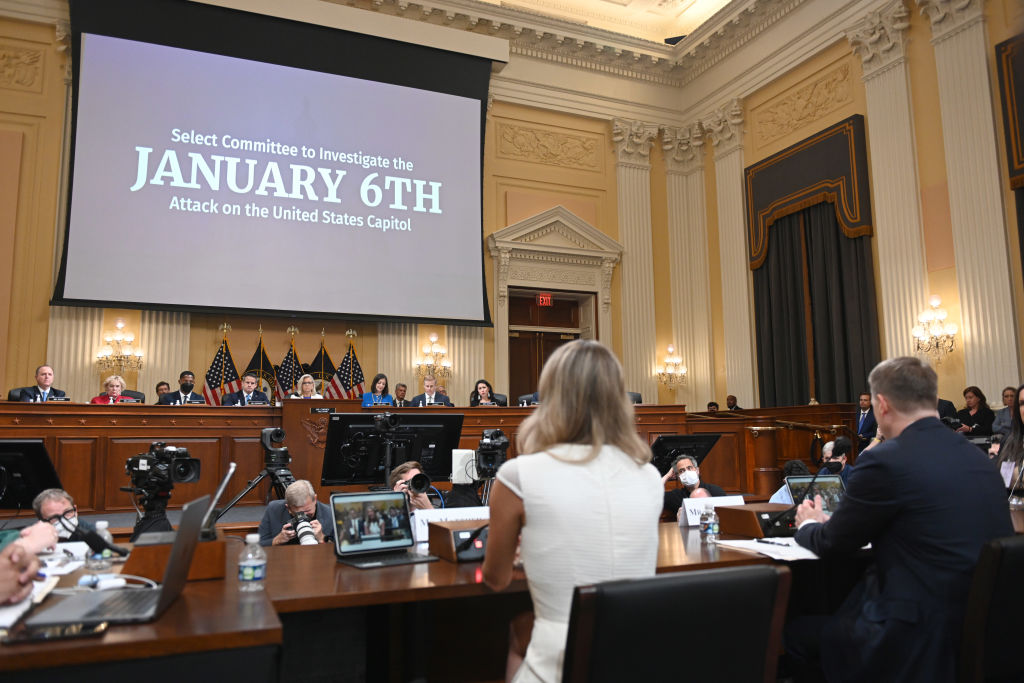
WASHINGTON, DC – JULY 21: Matthew Pottinger, former deputy national security adviser, and Sarah Matthews, former deputy press secretary, testify during a hearing of the House Select Committee to Investigate the January 6th Attack on the United States Capitol in the Cannon House Office Building on July 21, 2022 in Washington, DC. (Photo by Chen Mengtong/China News Service via Getty Images)
When House Democrats established their Jan. 6 committee to probe the alleged insurrection of 2021, it was widely assumed that the entire purpose of this congressional investigation was to prevent former President Donald Trump from running for the White House in 2024. Perhaps that was the original intention, but it is worth considering that, at some point, the Democrats realized they could use this committee as a weapon against the Republican Party itself. Of all the subpoenas issued by the committee, one, in particular, suggests that this entirely partisan body at some point decided it could go beyond a mere vendetta against one individual to cripple the entire political organization opposing it. While this congressional investigation has misfired several times, its most recent defeat may be the most telling.
 The Jan. 6 committee has reportedly dropped a subpoena – issued in February – against the Republican National Committee (RNC) and Salesforce, the company that manages its fundraising email campaign. Democrats investigating the Jan. 6 affair had claimed they needed information about the RNC’s fundraising strategy to better understand how the Republican Party’s governing body may have been instrumental in inciting the alleged insurrection of Jan. 6. The committee had argued that the requested records would “help investigators understand the impact of false, inflammatory messages in the weeks before January 6th [and] the flow of funds.”
The Jan. 6 committee has reportedly dropped a subpoena – issued in February – against the Republican National Committee (RNC) and Salesforce, the company that manages its fundraising email campaign. Democrats investigating the Jan. 6 affair had claimed they needed information about the RNC’s fundraising strategy to better understand how the Republican Party’s governing body may have been instrumental in inciting the alleged insurrection of Jan. 6. The committee had argued that the requested records would “help investigators understand the impact of false, inflammatory messages in the weeks before January 6th [and] the flow of funds.”
An Expanded Purpose for the Jan. 6 Committee?

So, it appears that Democrats may have been hoping that, rather than just pinning a serious charge on Mr. Trump, they could implicate the Republican Party itself in a potential act of treason – or what Democrats interpret as treason. But even beyond that, the Democratic Party could have obtained a priceless insight into the RNC’s fundraising apparatus. All of this might have been too late to help the Democrats in this year’s midterm elections, but it could have proved invaluable for 2024.
A leading Washington, DC, newspaper reported on an email written by House general counsel Douglas Letter notifying the parties of a motion to dismiss. The document said, in part, “Given the current stage of its investigation, the Select Committee to Investigate the January 6th Attack on the United States Capitol has determined that it no longer has a need to pursue the specific information requested.”

(Photo by Chen Mengtong/China News Service via Getty Images)
The RNC had previously challenged the subpoena, and Emma Vaughn, an RNC spokesperson, told the Washington newspaper:
“We said all along that this subpoena was unconstitutional. This is a victory for freedom of speech, privacy, and Americans’ right of political association without fear of partisan reprisal.”
One can only speculate as to why the Jan. 6 committee abandoned this course of action, but the importance of its decision can hardly be overstated. The repercussions of a judge ordering the RNC to turn over this vital information to its political adversaries would be seismic. Given the inability of this exercise in political persecution to produce meaningful results, this may have been the committee’s biggest and most desperate gamble.

